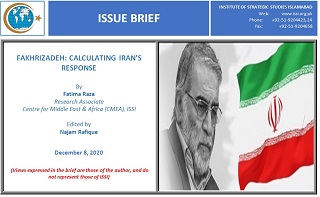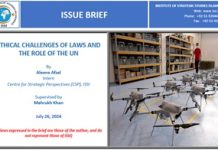Iran’s top nuclear scientist Mohsin Fakhrizadeh was killed on November 27, 2020when a group of gunmen ambushed his vehicle opening fire on him and his guards on a street just outside Tehran.[1] Mohsin Fakhrizadeh, albeit his low public profile, was very well-respected in Iran as a highbrow nuclear scientist and academic figure. Iranian state media as well as regional and global news channels were in a state of instant uproar after the news of his assassination became public. Predictably, Iran was quick to blame the Israeli intelligence agency Mossad for this covert operation calling it an act of ‘terrorism’.[2]
This blatant security breach so close to Iran’s capital city is most certainly not the first that the Islamic Republic has faced this year. Another attack took place in early November this year in which a high profile Al-Qaeda leader, Abu Muhammad al-Masri was killed in Tehran by Israeli agents on behest of the US authorities.[3]No official sources confirmed this news from within Iran and Israel both, however, the New York Times reported that this secret killing took place with the consent and knowledge of several US intelligence agents.[4]Earlier, assassination of the revered Iranian Revolutionary Guard (IRGC) commander, General Qassem Soleimani in January this year in Baghdad had offset Iran-US tensions in the region causing Iran to retaliate through a missile strike on American troops stationed within Iraq.[5] This recent killing of the Iranian scientist has exposed not only the internal insecurities of Iran but has also revealed the regional antagonism and animosity that revolves around Iran in general and its nuclear program in particular.
















